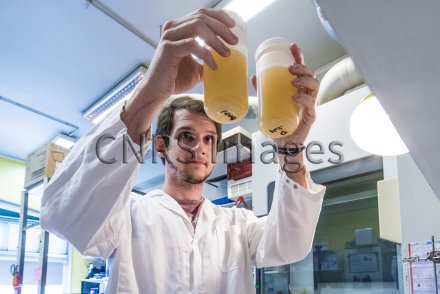Production year
2017

© Hubert RAGUET / Institut Cochin / CNRS Images
20170080_0008
Bacteria cultures producing a plasmid containing the DNA of antibodies from highly exposed seronegative (HESN) subjects. These bacteria will be concentrated via centrifugation, then stored at -20°C. The antibody DNA is then purified using chromatography. It will be introduced into eukaryotic cells to allow the production of antibodies in the form of proteins. These mucosal antibodies from HESN subjects will be used in various in-vitro tests so as to learn about their specific characteristics and antiviral properties against HIV-1. HESN individuals, for reasons that are still poorly understood but which are clearly linked to these repeated infectious exposures, have succeeded in showing an HIV-specific immune response in the mucosa in the form of IgA antibodies. These IgAs recognise the surface of the virus and block infection, protecting these HESN subjects from sexual infection. The "Mucosal entry of HIV and mucosal immunity" team led by Morgane Bomsel has set up an IgA combinatorial library using mucosa samples from HESN women. By characterising the specific nature of these IgAs and their antiviral activities at a cellular level, research scientists are aiming to use them either in passive therapy, through the application of locally protective IgAs in the form of a microbicide before sexual intercourse, or in a vaccine that replicates the production of these IgAs that protect the mucosa. A vaccination test in monkeys was found to protect them completely from repeated experimental vaginal infections. This was followed by a phase 1 clinical trial in which the vaccine succeeded in inducing IgA antibodies, shown to protect against the virus during in-vitro tests, in the vaccinated women. A clinical study in humans (women and men) on a larger scale using this same vaccine is currently being prepared.
The use of media visible on the CNRS Images Platform can be granted on request. Any reproduction or representation is forbidden without prior authorization from CNRS Images (except for resources under Creative Commons license).
No modification of an image may be made without the prior consent of CNRS Images.
No use of an image for advertising purposes or distribution to a third party may be made without the prior agreement of CNRS Images.
For more information, please consult our general conditions
2017
Our work is guided by the way scientists question the world around them and we translate their research into images to help people to understand the world better and to awaken their curiosity and wonderment.